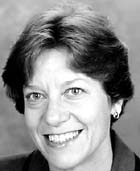With the first wave of baby boomers preparing for retirement, the 2005 White House Conference on Aging (WHCoA) to be held this fall in Washington, D.C., will be an important opportunity to assess aging in America and improve the lives of older Americans.
“The idea of volunteering and civic service offers a positive vision of the potential of baby boomers: older adults can be involved in meaningful roles that contribute to their communities and preserve their health and well-being,” Morrow-Howell continues. “The U.S. government and other service agencies need to expand and create institutions that make volunteering a natural part of later life.”
Once a decade, the WHCoA makes policy recommendations to the president and Congress. In the past, the conference has spawned programs such as Medicare and the National Institute on Aging. The 2005 conference, to be held Oct. 23-26, is intended to produce recommendations to guide national aging policy over the next decade through 2015.

The leading edge of the baby boomers will begin to turn 60 within two years, and for the next three to four decades, the 60-plus population will be significantly larger than today. This year’s conference will focus on opportunities and challenges presented by the “new” 60-plus population of 78 million, as well as consider issues that impact the mature older population.
St. Louis played a significant role in shaping the discussion at the upcoming WHCoA through a public forum last month on “Maximizing Civic Engagement of Older Adults.” Washington University’s School of Social Work and Center for Aging hosted the forum, which was designated an official WHCoA event.

During the forum, Amanda Moore McBride, Ph.D., a civic engagement expert and assistant professor of social work at Washington University, stated that an inclusive approach to service is necessary. She suggested a focus on increasing access, incentives and facilitation for all older adults interested in community service.
“If volunteerism has positive benefits for communities as well as older adults, then creation of opportunities is a social justice issue,” McBride says. “The call for greater voluntary action among older adults has been criticized as elitist and perhaps only applicable to those of privilege with ‘free’ time. A central challenge is to develop ways of leveraging engagement by all older adults who have the interest to do so.”
Morrow-Howell and McBride offer the following recommendations to the WHCoA Policy Committee to maximize the civic engagement of older adults:
- Take a progressive view toward financial incentives. Expand available tax credits for caregiving or contribute to pensions as “awards” for service.
- Expand the nation’s civic service programs. Programs such as AmeriCorps, which engages more than 50,000 Americans in intensive service to meet critical needs of communities, and the Retired and Senior Volunteer Program mix civic service and volunteerism, and could potentially involve large numbers of older adults.
- Focus on international civic service programs. There are crucial human needs around the world and there are older adults with technical and substantive skills who have a desire to travel. International service programs like Habitat for Humanity and Elderhostel could be expanded for those who can afford to join, whereas the Peace Corps may be most appropriate for those who qualify for stipends for living expenses.
- Offer computer training to older adults, which can improve their access to volunteer positions.
Experienced volunteers from St. Louis described the rewards they have received from service to the community during the Washington University WHCoA forum.
Lynn Kessler, a volunteer for Older Adult Service and Information System, said, “Volunteering offers me a stimulating atmosphere, a chance to socialize, a purpose with dignity, and a sense of pride and accomplishment.”
Morrow-Howell and McBride are pleased that the government is taking a closer look at service during later life.
“The 2005 WHCoA’s focus on civic engagement and volunteerism is forward thinking and exciting,” Morrow-Howell says. “We must increase opportunities for civic involvement for the later years of life when time availability and motivation suggest this may be the optimum time for such activities.”